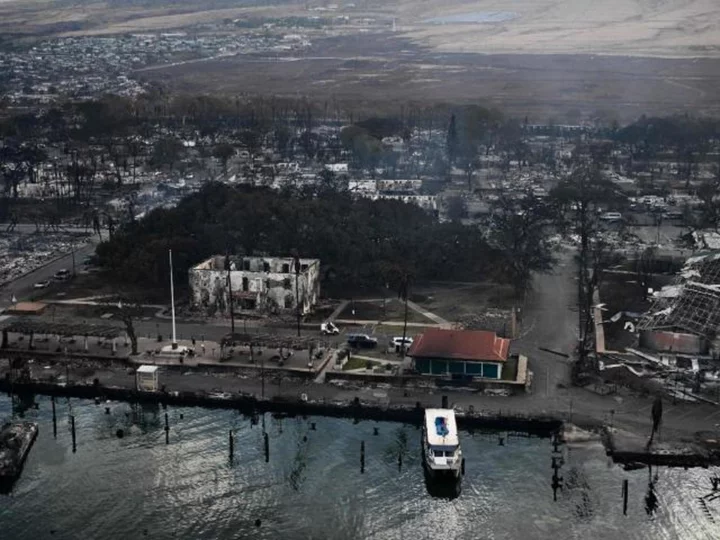The disastrous wildfires in Maui have ransacked virtually every aspect of life, killing at least three dozen people while scorching or imperiling buildings important to Hawaiian history, as well as a majestic tree known as a symbol of the island's culture.
Much of the western Maui community of Lahaina, home to about 12,000, has been destroyed, displacing hundreds of families, Hawaii Gov. Josh Green said Wednesday. More than 270 structures have been impacted in Lahaina, county officials added, many of them near one of the largest and most storied banyan trees in the United States.
A top tourist attraction, Lahaina once was the capital of the Hawaiian Kingdom, beloved by its kings and queens, as well as whaling ship crews and missionaries, according to the National Park Service. It's been a National Historic Landmark for more than six decades.
Lahaina's rich, centuries-old history had been preserved at historical sites and markers across the island town. Now, many are in ashes or severely jeopardized.
With cell service down on the island and witness reports still coming in, here's what we know so far about some of the important places affected by the wildfires' wrath:
The banyan tree
The fires have left little to no vegetation on the precious and sprawling banyan tree, satellite imagery and video on the Instagram account @lei_dubzz shows.
Imported from India and planted in front of the Lahaina Courthouse and Lahaina Harbor in 1873, the tree is one of the largest of its kind in the United States.
Stretching an entire city block and more than 60 feet tall, it has provided cooling shade to generations of locals and visitors beneath its massive, sweepy branches and dangling vines, according to the Hawaii Tourism Authority.
Events and art exhibits often have been held under its boughs, the agency says.
Just 8 feet tall when it was planted, the tree has 46 major trunks in addition to its massive original one and shades nearly two-thirds of an acre, according to the Lahaina Restoration Foundation. Its health and shape are maintained by the Maui County Arborist Committee.
Baldwin Home Museum
Just north of the tree, the Baldwin Home Museum -- an 1830s-era house believed to be the oldest on Maui -- has been reduced to ash, Lahaina Restoration Foundation Executive Director Theo Morrison confirmed to CNN on Wednesday.
Morrison was also trying to account for all employees of the foundation, which manages area museums and historical sites, but was hampered because cell service was still down.
The Baldwin Home's original four-room, single-level structure was built in the 1830s with a direct view to the Lahaina landing, where whaling ships would anchor, according to the foundation. It was home to a medical missionary, the Rev. Dwight Baldwin, and his family after its first owner, the Rev. Ephraim Spaulding, left the island when he got sick, the foundation said.
The Baldwin Home was restored to a mid-19th century design based on careful documentation and archaeological research and filled with original photographs and artifacts, along with donated furniture representing the 1850s, it said.
Waiola Church
Songs of worship in English and Hawaiian echoed for decades through the Waiola Church before its walls were swallowed Tuesday by wildfire flames, a Maui News photo of the inferno shows.
On the site of a mission established in the 1820s, Waiola Church had just celebrated its 200th anniversary in May. The church graveyard is the final resting place of early members of the Kingdom of Hawaii's royal family, according to the church's website.
Now, the faith community is left to assess the catastrophic damage.
Wo Hing Temple Museum
Near those scenes of devastation is the Wo Hing Temple Museum, a social and religious meeting place for the island's Chinese immigrant community. Satellite imagery shows broad fire destruction in the area.
The Wo Hing Society was created in 1909 by Chinese immigrants who came to Maui as contract sugar plantation laborers and eventually settled there permanently, according to the National Park Service.
The organization built a two-story temple in downtown Lahaina -- the Wo Hing Society Hall -- which served as a meeting place and housed an altar room for religious ceremonies, the agency said.
It later was restored and housed the Wo Hing Museum.
Lahaina Heritage Museum
The Lahaina Heritage Museum, just west of the banyan tree, also lies amid a field of fire debris captured by satellite images.
The structure once provided an interactive look at the history of Lahaina, from the epoch before European contact to the Monarchy era, including the missionary and whaling period, and from the Plantation era to early tourism, its website says.
The exhibit, "Always Lahaina," marked the first time Lahaina's full story was told in one location, according to its website.

